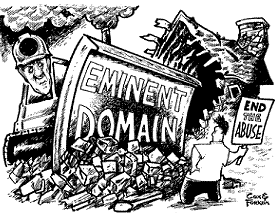You have your own home. You pay the mortgage, taxes, and insurance faithfully. You keep on top of the problems. When there’s a leak, you have it fixed immediately, same with that crack in the sidewalk, the furnace and all the other problems that worry you. Over the years, you’ve replaced windows, siding and the roof.
You do this so that your home is safe and comfortable. And, you do all these things with your own money. That’s because for most of you, your home is your most important possession. It’s where you’ll probably live until your time is up. Naturally, you hope you can pass your home to your children, to give them a head start. After all, you paid for it, so you can sell it or give it to anyone you choose.
That’s the old way of thinking. Today, if a greedy politician and developer figure they can do better with your property than you can, then poof, it’s not yours anymore.
What is That All About?
In June of 2005, the US Supreme Court ruled that New London Connecticut could seize private property and hand it over to private, profit making developers who claim that they can produce more tax revenue for the city than can the private citizens whose property is to be seized. All that was required was that the city had to designate that the privately owned property was “blighted”, and the developers could make more profitable use of that property than the current owners. This became known as the “Kelo” decision.
What is This “Blighted” Designation?
No one really knows. There simply is no legal definition whatsoever; just a political definition. If we were to see a neighborhood with a lot of graffiti, we may well describe the neighborhood as “blighted”, even if all the homes were beautiful, expensive and new. In another neighborhood, lawns not mowed, or filled with weeds or leaved not raked might lead to you claim the neighborhood was “blighted” – again, even though the homes are beautiful, expensive and new. Any neighborhood less than perfect can be declared as “blighted”. The word “blight” is a politician’s delight.
Just as beauty is in the eye of the beholder, so is blight. Politicians love meaningless words and phrases.
Greedy, predatory politicians love the word “blight” in connection with private property and high taxes and predatory developers’ who make promises to add to the tax revenues.
But Isn’t the Government Forbidden From Seizing Private Property for Non-Public Use?
Well, that refers to the Fifth Amendment of the US Constitution, which says: “No person shall be held to answer for a capital, or otherwise infamous crime, unless on a presentment or indictment of a Grand Jury, except in cases arising in the land or naval forces, or in the Militia, when in actual service in time of War or public danger; nor shall any person be subject for the same offense to be twice put in jeopardy of life or limb; nor shall be compelled in any criminal case to be a witness against himself, nor be deprived of life, liberty, or property, without due process of law; nor shall private property be taken for public use, without just compensation.”
This amendment does not refer to the taking of private property for private use.
But, in any event, there has never been any requirement in any law that private property is for the purpose of producing revenues – large or small – for any unit of government.
In this country there is any variety of private property: religious, business, medical, industrial, educational, recreational, farming, urban, rural, and on and on. Further, the Fifth Amendment refers to “property”, but does not restrict the meaning to “land”. Product patents are property, and there is a question as to whether a patent is protected by the amendment.
A wily politician (don’t kid about the redundancy of “wily) very easily could argue that your car, jewelry, even your “mileage” points are valuable property that could be far better used for revenue purposes by his predatory cronies. And, then, poof, again, they can be taken from you and transferred to another, more-promising private party.
Don’t Be Silly; That Would Never Happen. Never Has; Never Will.
Slow down here. There’s history to think about. Why was the Fifth Amendment even added to the US Constitution? Well, before our nation was founded, a king or emperor could and would take any property he desired. To limit the powers of our new government, the Fifth Amendment was written (among many other clauses and amendments).
We buy and sell property – land, and other property of significant value – with the use of contracts to spell out the details of the obligations of both buyer and seller. The US Constitution forbids any government unit from interfering with our rights to negotiate contracts.
We all love to haggle over the purchase of any automobile. Nearly all owners of autos love to tell their stories of how they “beat” the dealer at his game. We do the same when we buy or sell our home.
What we never want and will never accept is any government agent interfering with our right to buy and sell. Even the presence of a government official during negotiations would amount to interference. Both the buyer and seller would suspect (correctly) that the government’s presence or actions were for the purpose of favoring either the buyer or seller. We would all immediately suspect that the agent was “on the take” from the other.
What Does Any of This Have to Do with the “Kelo” Decision By the Supreme Court?
The “Kelo” decision unleashed the greed and predatory inclinations of politicians and developers throughout the nation. Here in New York, the incumbent billionaire mayor, Bloomberg, with his very wealthy (some also billionaires) developer cronies set their eyes on private property that needed to be seized in the name of “affordable housing” (another term that has no definition, but tugs at heartstrings).
The newly seized private property would then be transferred to selected (favored) private developers who promise to transform entire neighborhoods into hotels, convention centers, condominiums, sports arenas, shopping malls, 5-star restaurants, theaters, and all sorts of pricey offerings that could never be afforded by the original owners of the seized properties.
Why Wouldn’t These Developers Just Approach and Negotiate With the Original Private Property Owners?
Because, with the gun called eminent domain at the heads of these property owners, a gun held by the mayor, there’s no need at all for these very wealthy developers to ever deal with ordinary property owners.
We must negotiate with sellers. If we don’t want to pay the asking price, we either hike our offer or go elsewhere. We call that shopping.
But these very wealthy developers, with the mayor dictating terms, prefer that the mayor name the selling price (even if private property owners really prefer to keep the property) and force the seller to accept the price. In any event, the private property owner will be removed from the property.
For these very wealthy developers, it’s a great deal. Their side of the deal is very much like the mugger who demands you hand over your property at the point of a gun and having the police later tell you to be thankful you still have your life.



